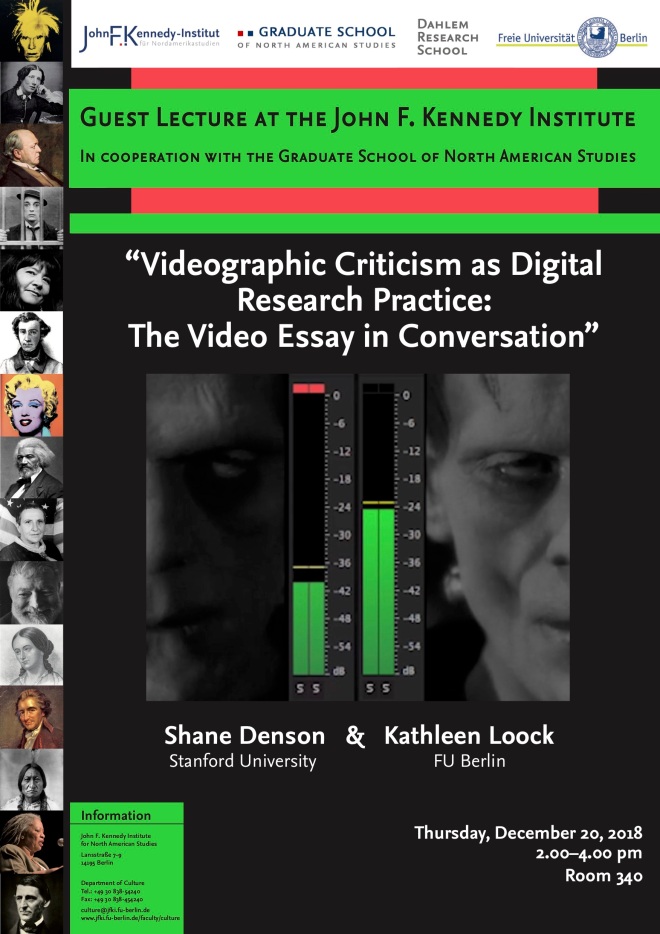
On Thursday, December 20, 2018 (2-4pm) at the JFK Institute at the Freie Universität Berlin, Kathleen Loock and I will be discussing “Videographic Criticism as Digital Research Practice.” Hoping to see some Berlin-based friends there!

On Thursday, December 20, 2018 (2-4pm) at the JFK Institute at the Freie Universität Berlin, Kathleen Loock and I will be discussing “Videographic Criticism as Digital Research Practice.” Hoping to see some Berlin-based friends there!
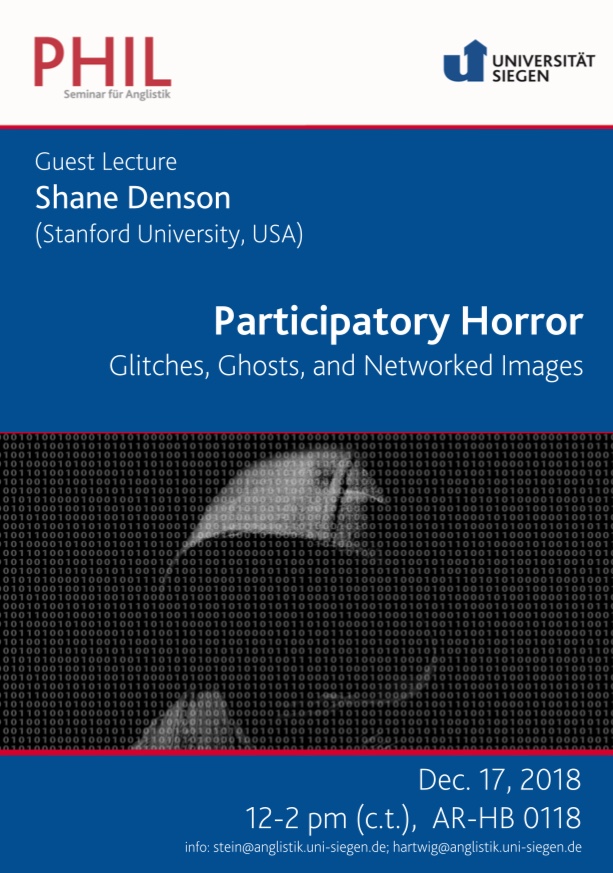
On December 17, 2018, I will be giving a talk titled “Participatory Horror: Glitches, Ghosts, and Networked Images” at the University of Siegen. Thanks to Marcel Hartwig and Daniel Stein for making this happen!
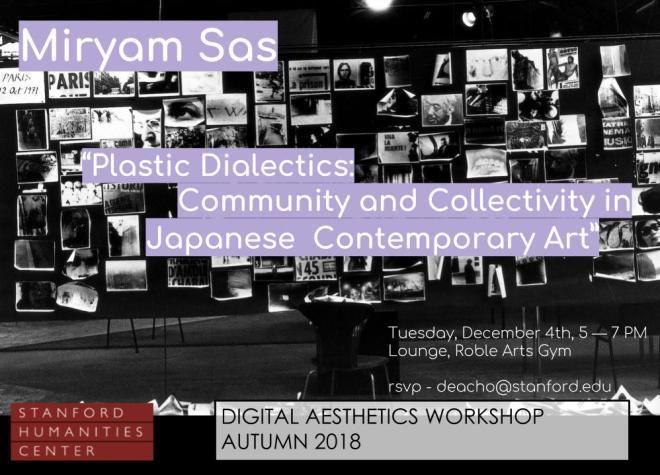
What do we mean when we speak of “collectivity,” collaboration, and community? How have artists and theorists in Japan questioned and created experimental practices that reframe these terms, so crucial to discussions of the arts today? Sas will reflect on issues of collectivity and assemblage as manifested in Japanese contemporary art, drawing examples from 1950s art theory, late 1960s intermedia art, 1970s site-specific photography events, and post 3-11 sculptural installation. Through site-specific critique and new modes of engagement with local space, artists in each of these distinct moments engage in a subtle but powerful rethinking of the frameworks and practices of collectives past and present.
At the next meeting of the Digital Aesthetics Workshop, Miryam Sas, Professor of Comparative Literature and Film & Media at UC Berkeley, will discuss Plastic Dialectics: Community and Collectivity in Japanese Contemporary Art. As we have throughout this quarter, we will meet on Tuesday, Dec 4, from 5-7 at the Roble Gym. RSVP to deacho@stanford.edu – we expect there will be a paper that we will pre-circulate this weekend.
Sas studies Japanese literature, film, theater, and dance; 20th century literature and critical theory; and avant-garde and experimental visual and literary arts. She is the author of Experimental Arts in Postwar Japan: Moments of Encounter, Engagement, and Imagined Return (Harvard, 2010); and Fault Lines: Cultural Memory and Japanese Surrealism(Stanford, 2001). Sas is currently working on a book on media theory and contemporary art in Japan, Feeling Media: Infrastructure, Potentiality, and the Afterlife of Art in Japan, for which she was awarded a President’s Research Fellowship in the Humanities (2017-18). She has published numerous articles in English, French, and Japanese on subjects such as Japanese futurism, cross-cultural performance, intermedia art, butoh dance, pink film and Japanese experimental animation.
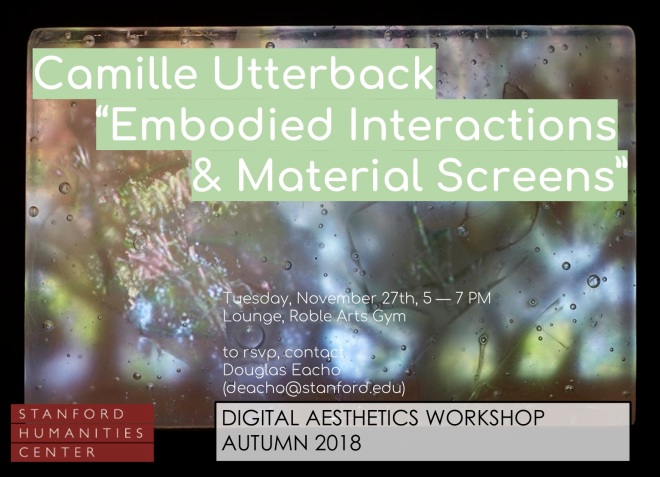
After a refreshing fall break, the Digital Aesthetics workshop will return with sessions on November 27th and December 4th . First up, we are thrilled to host Camille Utterback, Assistant Professor of Art Practice and Computer Science here at Stanford. We have always wanted to host an artist in the workshop, and could not be happier to build a conversation around Camille’s fascinating work and current questions. We look forward to seeing you there – please consider RSVPing so we can supply refreshments appropriately.
Embodied Interactions & Material Screens
w/ Camille Utterback
Tues, Nov 27, Roble Lounge, 5-7
rsvp to deacho at stanford.edu
After an overview of her interactive installation work, Camille will present on current works-in-progress which examine combinations of custom kiln-formed glass and digital animations. Her goal with her new work is to explore the possibilities of dimensional display surfaces that address the subtleties of our depth perception. What can be gained from more hybrid analog/digital and less “transparent” digital surfaces? What is at stake when our display surfaces maintain the illusion of a frictionless control vs an more complex and interdependent materiality? Camille is interested in developing a dialog around this new work, and welcomes a variety of critical input as she attempts to with situate her artworks in a theoretical framework. She has recently been reading Sensorium (ed. Caroline A. Jones), and Meredith Hoy’s From Point to Pixel.
Camille Utterback is a pioneer in the field of digital and interactive art. Her work ranges from interactive gallery installations, to intimate reactive sculptures, to architectural scale site-specific works. Utterback’s extensive exhibit history includes more than fifty shows on four continents. Her awards include a MacArthur Foundation Fellowship (2009), Transmediale International Media Art Festival Award (2005), Rockefeller Foundation New Media Fellowship (2002), Whitney Museum commission for their ArtPort website (2002), and a US Patent (2001). Recent commission include works for The Santa Cruz Museum of Art and History, Santa Cruz, California (2016), The Liberty Mutual Group, Boston, Massachusetts (2013), The FOR-SITE Foundation, San Francisco, California (2012), and the City of Sacramento, California (2011). Camille’s “Text Rain” piece, created with Romy Achituv in 1999, was the first digital interactive installation acquired by the Smithsonian American Art Museum.
Camille holds a BA in Art from Williams College a Masters degree from the Interactive Telecommunications Program (ITP) at NYU’s Tisch School of the Arts. She is currently an Assistant Professor in the Art & Art History Department, and by courtesy in Computer Science, at Stanford University. Her work is represented by Haines Gallery in San Francisco.
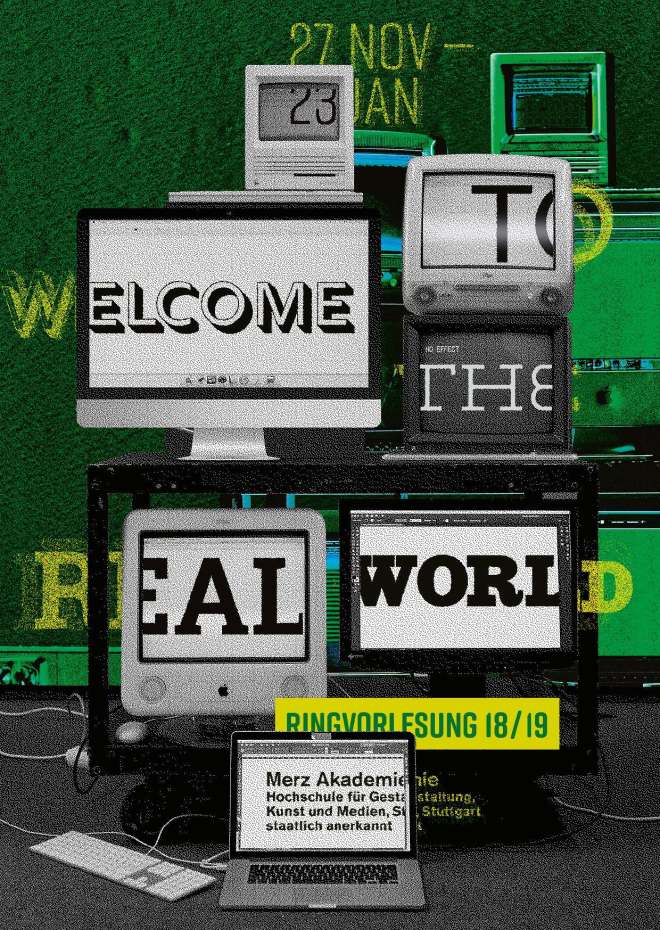
On December 18, 2018, I will be giving a public lecture titled “Desktop Horror” at the Merz Akademie in Stuttgart, as part of the Welcome to the Real World lecture series organized by Kevin B. Lee. I’m very excited to share this work, and hope to see friends in Germany!
Desktop Horror
Shane Denson
The shift from a cinematic to a post-cinematic media regime has occasioned a great deal of anxiety for theorists and spectators alike, and the horror genre has been adept at channeling this unease for its own purposes, as is evidenced in movies that revolve around the proliferation of digital devices and networks as new media for ghosts, demons, and other forms of evil. In this presentation, I focus on “desktop horror” in particular and argue that the fears elicited in post-cinematic horror are deeply rooted in the upheaval that viewers experience in the face of a thoroughly computational lifeworld.
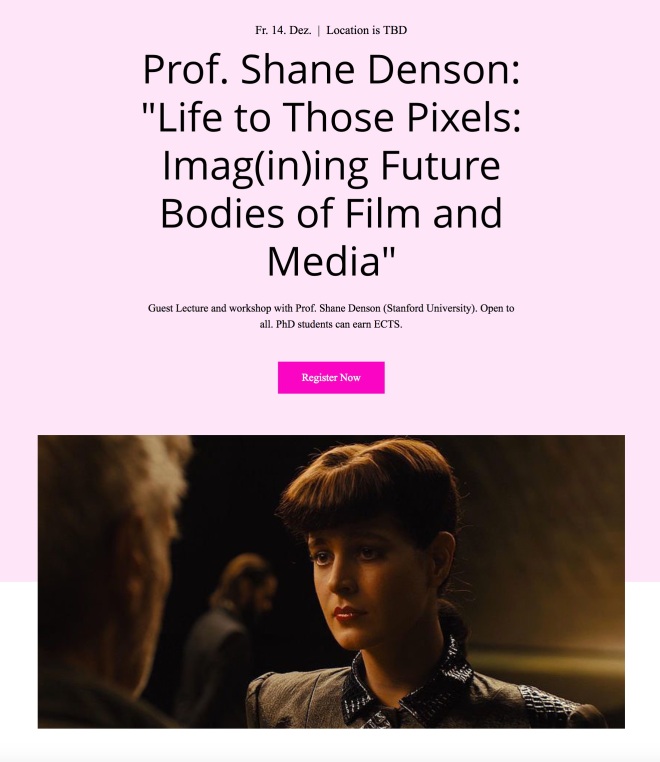 On December 14, 2018, I will be giving a talk titled “Life to Those Pixels: Imag(in)ing Future Bodies of Film and Media” at the University of Zurich, as part of the Imag(in)ing Future Bodies series hosted by the Doctoral Program of the English Department and organized by Morgane Ghilardi and Hannah Schoch. The lecture will be followed by a workshop in which we will discuss related work on post-cinema and discorrelated images.
On December 14, 2018, I will be giving a talk titled “Life to Those Pixels: Imag(in)ing Future Bodies of Film and Media” at the University of Zurich, as part of the Imag(in)ing Future Bodies series hosted by the Doctoral Program of the English Department and organized by Morgane Ghilardi and Hannah Schoch. The lecture will be followed by a workshop in which we will discuss related work on post-cinema and discorrelated images.
For more information, see the program website here, or register for the event here.

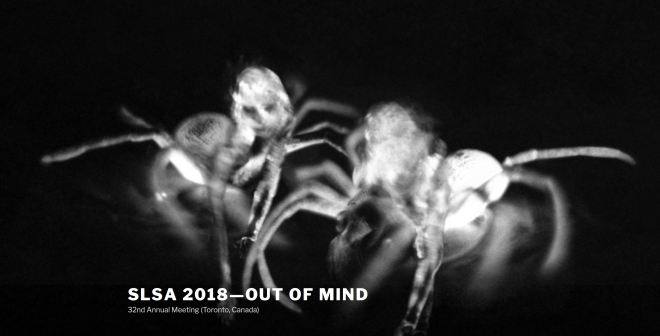
On Saturday, Nov. 17 (3:30 – 5:00pm), I will be presenting alongside Beth Coleman, Jacob Gaboury, James Malazita, and Patrick Keilty on a panel titled “Unstable Interface” at the 32nd Annual Meeting of the Society for Literature, Science, & the Arts (SLSA) in Toronto.
Here’s the panel lineup:
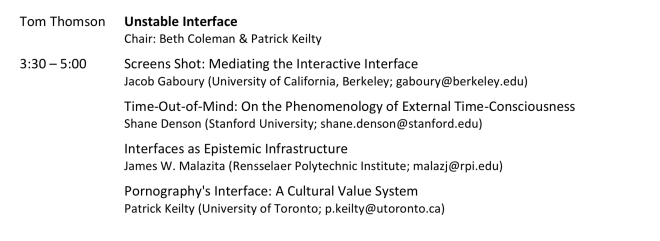
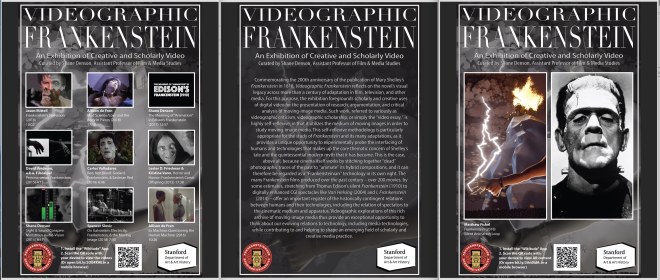
The Videographic Frankenstein exhibition at Stanford came to a close today, but like any good monster its demise is only temporary… On November 8, 2018, the show will be resurrected in the form of an augmented reality pop-up exhibition at the Library of Congress in Washington, D.C., as part of an event called “Playtest: An Open House for Emerging Media in the Digital Humanities” organized by Tahir Hemphill.
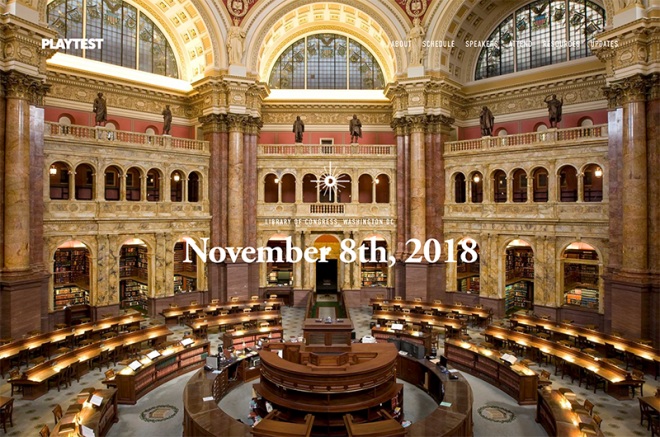
Incidentally, the Library of Congress has just made a beautiful new restoration of Thomas Edison’s 1910 Frankenstein available here.
Check it out!
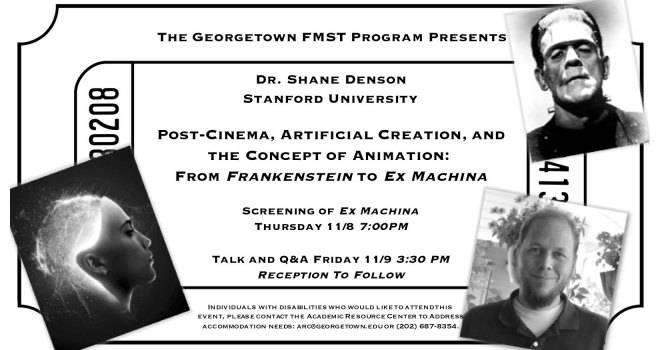 On Friday, November 9, I will be giving a talk titled “Post-Cinema, Artificial Creation, and the Concept of Animation: From Frankenstein to Ex Machina” at Georgetown University’s Film and Media Studies Program.
On Friday, November 9, I will be giving a talk titled “Post-Cinema, Artificial Creation, and the Concept of Animation: From Frankenstein to Ex Machina” at Georgetown University’s Film and Media Studies Program.
This is work stemming from my current book project, Discorrelated Images, which I am excited to present. Thanks to Caetlin Benson-Allott and Sky Sitney for inviting me to speak! For further information about the event, please contact Caetlin Benson-Allott.
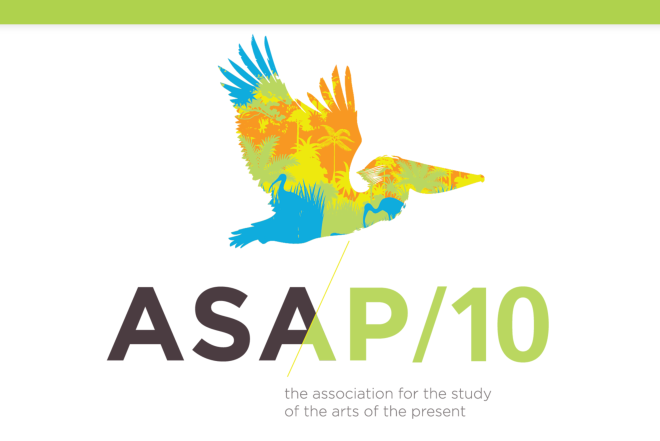
Next week, Oct. 17-20, 2018, the Association for the Study of the Arts of the Present (ASAP) will be holding its annual conference in New Orleans. There I will be on a panel, called “Images Otherwise,” with some excellent co-panelists: Andrew Johnston (NC State), Brooke Belisle (SUNY Stony Brook), and Jacob Gaboury (UC Berkeley). I will be presenting work related to my forthcoming book, Discorrelated Images.
Here is my abstract:
Images of Discorrelation
Shane Denson, Stanford University
This presentation deals with the ongoing transition from a cinematic to a post-cinematic media regime. Situated at the cusp between film studies and digital media studies, “images of discorrelation” names a variety of contemporary visual phenomena (glitches, artifacts, motion-smoothing, etc.) and seeks to articulate a theory of the perceptual, actional, and above all affective impacts of the thoroughgoing computationalization of moving-image media. The concept of “discorrelation” concerns the severing of phenomenological relations between viewing subjects and image-objects; it results from the failure, on the part of contemporary cameras and other imaging devices, to situate spectators in a coherently articulated viewing position. Furthermore, discorrelation is an effect of the microtemporal processing of computational images, which impacts viewers’ own embodied processing of time at a subperceptual level, prior to the articulation of subject-object relations. This generative dimension implicates computational imaging systems, including their use in mainstream movies and other media, in a fundamental transformation of human-technological relations.